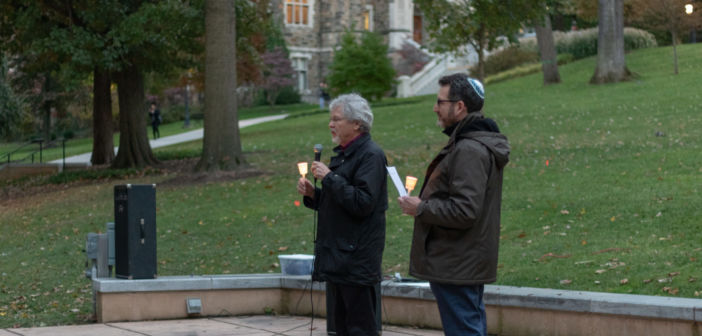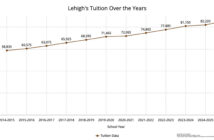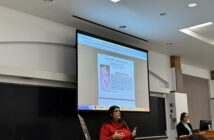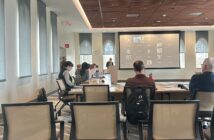Rabbi Michael Singer was conducting a funeral service at the Congregation Brith Sholom Cemetery in Fountain Hill, Pennsylvania, in the fall of 2018.
As the family was grieving and burying their mother, a car carrying four men pulled up to the grave site on the South Side of Bethlehem. The windows slowly rolled down.
Then came the shouting.
“You f***ing Jews,” they said. “I hope you all die.”
On Oct. 27, Robert Bowers walked into the Tree of Life Synagogue in Pittsburgh, just after Shabbat services had begun.
Bowers pulled out a gun and killed 11 people and wounded seven others as they prayed. During the attack, he was heard screaming anti-Semitic remarks, according to USA TODAY and law enforcement officials.
“All Jews must die,” he said.
These attacks on Pennsylvania communities are just two examples of anti-Semitic rhetoric that has been on the rise throughout the U.S. since 2016. In its 2017 audit of anti-Semitic incidents, the Anti-Defamation League found that there was a 57 percent increase in anti-Semitic incidents compared to the year prior. Pennsylvania had the sixth-highest number of incidents in the U.S. — 96 cases in 2017 alone.
Both the Tree of Life massacre and the incident at the Congregation Brith Sholom Cemetery happened at the most vulnerable moment, where people felt as though they were in safe spaces or during times of prayer, according to Jeri Zimmerman, the interim executive director of the Jewish Federation of the Lehigh Valley.
“Why we refer to the cemetery incident or what was so tremendously disturbing about Pittsburgh, aside from the blatant act of anti-Semitism, is that while you are praying or to be at a loved one’s funeral and to have it invaded — I think that’s what is so disturbing,” Zimmerman said.
Though Singer said the incident at the cemetery is the harshest he has personally witnessed in the Lehigh Valley, there have been other incidents both in the school districts and at Congregation Brith Sholom, which is the only synagogue in Bethlehem.
Within the school districts in the Lehigh Valley, Singer said that incidents can range from people drawing swastikas on the bathroom walls to people saying the Holocaust never happened. He said sometimes these incidents are personal, targeting specific students, while other times they can be more general.
Aaron Gorodzinsky, the director of outreach and community relations at the Jewish Federation of the Lehigh Valley, said the schools in the area have been proactive in working with Jewish students to make sure they feel protected while at school.
Zimmerman said it is hard to tell sometimes where kids are developing an anti-Semitic mindset and what is driving them to commit these incidents, specifically at the elementary and middle school levels. She said either young kids are trying to joke around and think it’s funny, or they are learning this rhetoric at home.
One planned anti-Semitic rally in Bethlehem that was eventually canceled was a white supremacist march, which was supposed to occur following the Charlottesville massacre in August 2017. According to Gorodzinsky, white supremacist leaders had planned marches across the U.S., but when there were more counter-protesters in attendance at their first march, the organizers canceled the remaining marches. Gorodzinsky said a bar mitzvah at a synagogue a mile away from the march’s route was scheduled for the same day as the march.
The Jewish Federation of the Lehigh Valley worked closely with both the City of Bethlehem and the synagogue to make sure the bar mitzvah attendees felt safe.
“Unfortunately, the city couldn’t do much against the march because anybody has the right to express their opinions, whether we agree or disagree, so the city couldn’t ban the marches because it is illegal to do so,” Gorodzinsky said.
Synagogues and other places of religious importance, such as Hillels, are often a target of anti-Semitism as well. At Brith Sholom, Singer is constantly on the lookout for signs of anti-Semitism directed toward his congregation. At the Lehigh Hillel house, Rabbi Steven Nathan had panic buttons installed throughout the building.
“At one point, we couldn’t even open our mail,” Singer said. “We had to have the police do that.”
The increase in security measures throughout the community goes beyond having mail inspected. Gorodzinsky said the Jewish Federation of the Lehigh Valley hosts an annual security seminar around the time of the Jewish high holidays. They invite people from the FBI, Anti-Defamation League and Department of Homeland Security to train volunteers and to teach people how to react if a certain security incident were to occur.
“Security is not something we just started doing because of what happened in Pittsburgh,” Gorodzinsky said.
Gorodzinsky said many of the reports after the Pittsburgh massacre revealed that many more lives would have been lost if the Tree of Life Synagogue hadn’t had security measures in place.
Nathan described a cellular app that gives Jewish leaders in the Lehigh Valley an added sense of security. The app allows anyone to send out a message to the entire list of Jewish clergy if there is any worry about a suspicious person or group that may be harmful to the Jewish community.
The app is just one of many ways Nathan is protecting the Jewish community that attends Hillel at Lehigh. He said he started locking the doors to the Jewish Student Center and installed panic buttons last year.
“I remember last year when I started having the door locked and having the panic button, people were like, ‘Well why would you want to do that?’ and I was like, ‘Well, hopefully we will never need to use them,’” Nathan said.
The unity of the Jewish people in the Lehigh Valley is something that has been highly emphasized throughout the entire community, whether through the security seminars, Anti-Defamation League workshops or interfaith community vigils.
Singer emphasized the importance of remaining safe and taking smart steps while also remaining an open sector of society. He said he still wants his synagogue to remain open to strangers who are interested in learning or praying.
“But we will not be silent,” Singer said. “Not by hate, and certainly we far outweigh those who hold anti-Semitism and hatred in their hearts.”






Comment policy
Comments posted to The Brown and White website are reviewed by a moderator before being approved. Incendiary speech or harassing language, including comments targeted at individuals, may be deemed unacceptable and not published. Spam and other soliciting will also be declined.
The Brown and White also reserves the right to not publish entirely anonymous comments.